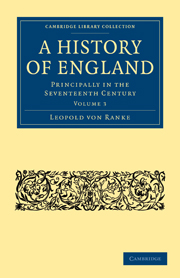Book contents
- Frontmatter
- Contents
- BOOK XI THE COMMONWEALTH IN ENGLAND, 1649—1653
- BOOK XII THE PROTECTORATE OF OLIVER CROMWELL, 1653–1658
- CHAP. I Oliver Cromwell and his elevation to the Protectorate
- CHAP. II Embassy to Sweden. Peace with Holland
- CHAP. III The Parliament of 1654
- CHAP. IV Military government. Religious tolerance
- CHAP. V Rupture with Spain
- CHAP. VI The Parliament of 1656, 1657. Idea of a Cromwellian Monarchy
- CHAP. VII The general position of the Protectorate at home and abroad in 1657 and 1658
- CHAP. VIII Death of Oliver Cromwell
- BOOK XIII FALL OF THE PROTECTORATE AND THE COMMONWEALTH. RESTORATION OF THE MONARCHY, 1658—1660
- BOOK XIV THE FIRST FIVE YEARS UNDER CHARLES II. THE RESTORATION OF THE ANGLICAN CHURCH
- BOOK XV THE DUTCH WARS OF CHARLES II. ESTABLISHMENT OF THE PROTESTANT AND PARLIAMENTARY CHARACTER OF THE CONSTITUTION 1664—1674
CHAP. II - Embassy to Sweden. Peace with Holland
Published online by Cambridge University Press: 07 June 2011
- Frontmatter
- Contents
- BOOK XI THE COMMONWEALTH IN ENGLAND, 1649—1653
- BOOK XII THE PROTECTORATE OF OLIVER CROMWELL, 1653–1658
- CHAP. I Oliver Cromwell and his elevation to the Protectorate
- CHAP. II Embassy to Sweden. Peace with Holland
- CHAP. III The Parliament of 1654
- CHAP. IV Military government. Religious tolerance
- CHAP. V Rupture with Spain
- CHAP. VI The Parliament of 1656, 1657. Idea of a Cromwellian Monarchy
- CHAP. VII The general position of the Protectorate at home and abroad in 1657 and 1658
- CHAP. VIII Death of Oliver Cromwell
- BOOK XIII FALL OF THE PROTECTORATE AND THE COMMONWEALTH. RESTORATION OF THE MONARCHY, 1658—1660
- BOOK XIV THE FIRST FIVE YEARS UNDER CHARLES II. THE RESTORATION OF THE ANGLICAN CHURCH
- BOOK XV THE DUTCH WARS OF CHARLES II. ESTABLISHMENT OF THE PROTESTANT AND PARLIAMENTARY CHARACTER OF THE CONSTITUTION 1664—1674
Summary
Effective and successful as the undertakings of the Commonwealth had been, especially in the Dutch war, yet the isolated position it held in the face of Europe was felt to be a source of annoyance and even of danger. The States-General found allies: Denmark for instance pledged herself to refuse not only English men of war, but English merchant vessels free passage through the Sound. They entered into negotiations with France, which was not willing to permit their ruin, and even gave them hopes of terminating their quarrel with Portugal. Lastly, had the Pope and Catholic clergy, among whom the design was incessantly discussed, succeeded in bringing about the peace between France and Spain, Charles II could once more have found enough support among the foreign powers to make him, in spite of the defeat of his adherents at home, again appear important and dangerous.
On the other hand, the mode in which the English Commonwealth had been founded had, as the catastrophes in Holland and Spain showed, evoked among high and low a prejudice against it which rendered a formal diplomatic intercourse almost impossible.
One of the most remarkable tokens of respect which the maiden daughter of Gustavus Adolphus, Christina, Queen of Sweden, received from abroad, was unquestionably the gift of his own picture from Cromwell. The brow on which time and the untiring prosecution of a war which had led through the bewildering paths of fortune, and the hard helmet had imprinted wrinkles,—this brow bends reverently before her.
- Type
- Chapter
- Information
- A History of EnglandPrincipally in the Seventeenth Century, pp. 119 - 128Publisher: Cambridge University PressPrint publication year: 2010First published in: 1875

